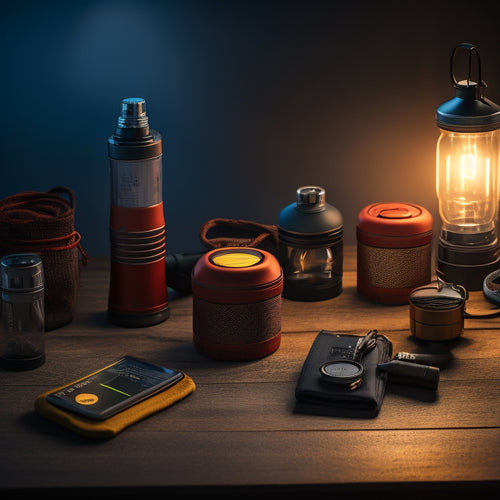
Solar Panel Battery
Share
You're looking to achieve renewable energy independence with a solar panel battery, which stores excess energy for nighttime or cloudy day use, guaranteeing a steady power supply during low sunlight or grid outages. Proper system sizing is essential to meet your energy demands and guarantee reliability. You'll want to evaluate advanced battery systems like Lithium-Ion, which offer high energy efficiency and a long cycle life. As you investigate energy storage solutions, you'll also need to monitor your battery's health, optimizing its performance and lifespan. Now, take a closer look at how a well-designed solar panel battery system can revolutionize your energy generation and consumption.
The Essentials
- Solar panel batteries store excess energy for nighttime or cloudy day use, guaranteeing a steady power supply during low sunlight or grid outages.
- Lithium-Ion batteries offer 95-98% energy efficiency and 3,000-5,000 cycles, making them a popular choice for solar panel energy storage.
- Proper system sizing is vital for meeting energy demands and ensuring reliability, taking into account appliances' power consumption and energy storage capacity.
- Advanced battery systems optimize solar energy harvesting and consumption, reducing carbon emissions and energy bills while promoting a cleaner environment.
- Regular battery health checks, including tracking depth of discharge, are essential for peak performance, identifying potential issues early, and extending battery lifespan.
Renewable Energy Independence Guaranteed
You'll achieve renewable energy independence assured by leveraging energy storage solutions that enable you to store excess energy generated by your solar panel battery for later use.
With advanced battery systems, such as Renewable Power Solutions, you can alleviate the burden of high energy bills and reduce grid dependence.
These solutions guarantee a steady power supply, even during periods of low sunlight or grid outages.
Energy Storage Solutions
Switching to renewable energy sources is a significant step towards achieving independence from the grid, but it's only half the battle. You need a reliable energy storage solution to guarantee a steady power supply when the sun isn't shining or the wind isn't blowing. This is where solar panel batteries come in – they store excess energy generated during the day for use during the night or on cloudy days.
When choosing an energy storage solution, you'll want to take into account factors such as energy efficiency, battery type, and cost. Here's a breakdown of some popular battery types:
| Battery Type | Energy Efficiency | Cycle Life |
|---|---|---|
| Lead-Acid | 80-90% | 200-300 cycles |
| Lithium-Ion | 95-98% | 3,000-5,000 cycles |
| Nickel-Cadmium | 90-95% | 1,000-2,000 cycles |
| Sodium-Ion | 85-90% | 1,000-2,000 cycles |
Off-Grid Power Systems
With a reliable energy storage solution in place, it's time to investigate the ultimate goal of renewable energy systems: off-grid power systems that guarantee independence from the grid.
You're now one step closer to breaking free from the constraints of traditional energy providers. By utilizing the power of the sun with an off-grid solar kit, you can solve three major problems that come with relying on the grid or generators: high energy costs, noisy and polluting fuel-based systems, and limited access to power in remote areas.
To achieve true energy independence, you'll need a system that seamlessly integrates your solar panel array with your energy storage solution. This is where solar integration comes in – the process of connecting your solar panels to your off-grid power system.
A well-designed system guarantees that your solar panels generate electricity efficiently, which is then stored in your battery for later use. Proper system sizing is vital to confirm your off-grid power system meets your energy demands.
You'll need to calculate your energy requirements, considering factors like your appliances' power consumption and your desired level of energy independence. By doing so, you'll be able to design a system that provides reliable, sustainable energy whenever you need it.
With an off-grid power system, you'll enjoy the freedom to generate your own clean energy, reducing your reliance on the grid and your carbon footprint.
Reduced Carbon Footprint Guarantee
You're likely aware that adopting a solar panel battery system greatly reduces your reliance on fossil fuels.
By integrating eco-friendly energy storage into your setup, you'll effectively lower your carbon emissions today.
With affordable solar panel battery storage systems like the Tesla Powerwall solar storage system cost and LG Chem RESU, you can enjoy reduced energy bills and a cleaner conscience.
This means you'll be producing cleaner energy and contributing less to greenhouse gas emissions, which is an essential step towards a more sustainable future.
Eco-Friendly Energy Storage
The incorporation of eco-friendly energy storage solutions into your solar panel system guarantees a reduced carbon footprint assurance, allowing you to employ renewable energy while minimizing your impact on the environment.
By integrating eco-friendly energy storage, you can optimize your solar energy harvesting and consumption, ensuring a sustainable living experience. This innovative approach to energy management enables you to store excess energy generated during the day for use during the night or on cloudy days, thereby reducing your reliance on the grid.
Eco-friendly energy storage solutions, such as advanced battery systems, are designed to maximize battery efficiency and grid integration.
These smart technologies seamlessly integrate with your home automation system, providing real-time monitoring and control over your energy consumption.
By adopting eco-friendly energy storage, you're not only reducing your environmental impact but also contributing to a cleaner, more sustainable future.
With the ability to capture renewable resources and manage your energy effectively, you'll be well on your way to achieving a reduced carbon footprint and a more energy-independent lifestyle.
Lower Emissions Today
By utilizing eco-friendly energy storage solutions, you can greatly minimize your carbon footprint, effectively reducing greenhouse gas emissions and mitigating climate change. This reduced carbon footprint assurance is made possible through the integration of solar panel batteries into your energy system.
By utilizing sustainable energy from the sun, you can markedly decrease your reliance on fossil fuels, resulting in a substantial emission reduction.
With a solar panel battery, you can store excess energy generated during the day for use during the night or on cloudy days. This guarantees a consistent and reliable energy supply, reducing your dependence on the grid and the associated carbon emissions.
By choosing sustainable energy sources, you're contributing to a cleaner environment and a healthier planet. Additionally, you're also investing in your freedom from reliance on finite resources, guaranteeing a more secure energy future.
Deep Cycle Battery Technology
You're likely familiar with the importance of reliable energy storage in solar panel systems, which is essential for maximizing renewable energy storage and reducing reliance on the grid high-performance batteries.
When it comes to deep cycle battery technology, you need to take into account advanced battery chemistry that guarantees efficient energy storage and release, such as lithium-ion batteries for solar systems.
Specifically, you'll want to examine the cycle life performance of your battery, which refers to the number of charge and discharge cycles it can handle before its capacity degrades.
Advanced Battery Chemistry
Sophistication in energy storage has led to a model shift in deep cycle battery technology, elevating it to unparalleled heights of performance and reliability.
You're now experiencing the benefits of advanced battery chemistry, which has revolutionized the industry. Solid-state batteries, for instance, have replaced traditional lithium-ion batteries, offering enhanced safety, energy density, and charging speeds.
This innovative design eliminates the risk of thermal runaway, ensuring your solar panel battery operates with utmost stability. Furthermore, lithium sulfur technology has emerged as a promising alternative, boasting higher energy density and a more environmentally friendly footprint.
As you investigate the world of advanced battery chemistry, you'll uncover a plethora of options customized to meet your specific energy needs.
Manufacturers are now pushing the boundaries of innovation, focusing on sustainable, high-performance solutions that grant you the freedom to utilize renewable energy with confidence.
Cycle Life Performance
Three hundred to five hundred charge cycles is the typical lifespan of a traditional deep cycle battery, but advanced battery chemistry has greatly improved this benchmark.
You can now expect up to 5,000 to 7,000 charge cycles from some of the latest deep cycle batteries. This increased cycle life performance is vital for your solar panel battery, as it directly affects its overall lifespan and reliability.
When evaluating a deep cycle battery's cycle life performance, you should consider key performance metrics such as capacity retention, round-trip efficiency, and battery degradation.
Battery degradation, in particular, is an essential factor, as it measures the battery's ability to hold its capacity over time. A high-quality deep cycle battery will exhibit minimal battery degradation, ensuring consistent performance throughout its lifespan.
Check Battery Depth of Discharge
You need to check the depth of discharge (DOD) of your solar panel battery regularly to guarantee its ideal performance and longevity.
A battery health check will help you determine the DOD, which is critical in preventing over-discharging that can damage the battery.
Implementing a reliable renewable energy solution and investing in a high-quality solar power battery can also contribute to the overall efficiency of your system.
Battery Health Check
During the solar panel battery's operational lifetime, it's essential to perform regular battery health checks to guarantee peak performance and extend its lifespan.
You'll want to monitor your battery's state of charge, voltage, and temperature to identify any potential issues before they become major problems.
This involves tracking your battery's depth of discharge, which is the percentage of the battery's capacity that's been used.
Optimal Discharge Levels
How deeply should you discharge your solar panel battery to maximize its lifespan and performance? The answer lies in understanding the ideal discharge levels for your battery.
Discharging your battery too deeply can reduce its lifespan, while not discharging it enough can decrease its efficiency. A general rule of thumb is to aim for a depth of discharge (DOD) between 20% and 50%. This allows you to maximize your battery's capacity while minimizing wear and tear.
Here is a breakdown of the recommended DOD levels for different battery types:
| Battery Type | Recommended DOD | Discharge Efficiency |
|---|---|---|
| Lead-Acid | 20-30% | 80-90% |
| Lithium-Ion | 20-50% | 90-95% |
| Nickel-Cadmium | 30-50% | 85-90% |
| Nickel-Metal Hydride | 30-50% | 85-90% |
Longer Cycle Life Guaranteed
You'll want a solar panel battery that guarantees extended power backup during outages, which is where a longer cycle life comes into play.
With a longer cycle life, you can rest assured that your battery will provide reliable power backup over an extended period.
Extended Power Backup
Frequently, homeowners and businesses rely on solar panels to provide a sustainable source of energy, but they often overlook the importance of an extended power backup system. This oversight can lead to power outages during periods of low sunlight or high energy demand. You need a reliable backup system to guarantee a steady supply of energy, even when the sun isn't shining.
An extended power backup system integrated with your solar panel battery provides cost efficiency and system integration. This means you can store excess energy generated during the day for use during the night or on cloudy days. With an extended power backup system, you can:
| System Component | Description | Benefits |
|---|---|---|
| Deep Cycle Battery | Stores excess energy for later use | Provides power during outages |
| Inverter/Charger | Converts DC to AC power and charges battery | Guarantees reliable energy supply |
| Monitoring System | Tracks energy production and consumption | Optimizes energy usage and detects issues |
Frequently Asked Questions
Can I Use My Solar Panel Battery as a Backup Power Source?
You can use your battery as a backup power source, but it's essential to evaluate the battery capacity and energy efficiency to guarantee you have enough power to meet your needs during an outage, and to optimize its performance.
Are Solar Panel Batteries Compatible With All Solar Panel Systems?
You'll find that battery compatibility varies across solar panel types, so you'll need to verify the battery you choose is compatible with your specific panel system, considering factors like voltage, ampere, and communication protocols.
How Do I Maintain My Solar Panel Battery to Extend Its Lifespan?
To unfasten your energy freedom, you monitor and regulate your battery's capacity, follow precise maintenance tips, and track discharge cycles to optimize charging efficiency, ensuring a prolonged lifespan and maximum performance.
Can I Charge My Solar Panel Battery Using a Generator?
When using a generator, you'll want to guarantee generator compatibility to maintain charging efficiency. Check your solar panel battery's specifications to verify compatibility, then adjust the generator's output to match the battery's recommended charging voltage and current.
Are Solar Panel Batteries Affected by Extreme Temperatures?
Curiously, you'll find that extreme temperatures coincidentally affect many technologies, including energy storage. In your case, yes, temperature effects can impact battery performance, with high temps reducing capacity and low temps slowing charge rates.
Final Thoughts
With a solar panel battery, you'll be generating electricity like a pro! You'll be a rockstar of renewable energy, enjoying a guilt-free conscience and a markedly reduced carbon footprint. Our deep cycle battery technology guarantees a longer cycle life, and you can monitor the battery depth of discharge with ease. What's more, you'll be saving a small fortune on energy bills! With our solar panel battery, you'll be living the dream - a life of energy independence, where the sun is your personal power plant!
Related Posts
-

Best Solar Powered Flashlights for Emergency Situations
When you're choosing the best solar-powered flashlights for emergency situations, focus on their brightness, battery ...
-

The Role of Battery Monitoring Systems in Renewable Energy
Battery monitoring systems play an essential role in renewable energy by enhancing system longevity and optimizing pe...
-

Smart Grid Technology Implementation Challenges
You'll encounter several challenges when implementing smart grid technology, particularly in cost management, scalabi...


